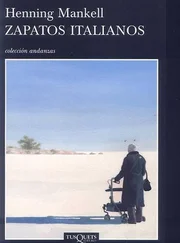Henning Mankell - Sidetracked
Здесь есть возможность читать онлайн «Henning Mankell - Sidetracked» весь текст электронной книги совершенно бесплатно (целиком полную версию без сокращений). В некоторых случаях можно слушать аудио, скачать через торрент в формате fb2 и присутствует краткое содержание. Жанр: Полицейский детектив, на английском языке. Описание произведения, (предисловие) а так же отзывы посетителей доступны на портале библиотеки ЛибКат.
- Название:Sidetracked
- Автор:
- Жанр:
- Год:неизвестен
- ISBN:нет данных
- Рейтинг книги:4 / 5. Голосов: 1
-
Избранное:Добавить в избранное
- Отзывы:
-
Ваша оценка:
- 80
- 1
- 2
- 3
- 4
- 5
Sidetracked: краткое содержание, описание и аннотация
Предлагаем к чтению аннотацию, описание, краткое содержание или предисловие (зависит от того, что написал сам автор книги «Sidetracked»). Если вы не нашли необходимую информацию о книге — напишите в комментариях, мы постараемся отыскать её.
Sidetracked — читать онлайн бесплатно полную книгу (весь текст) целиком
Ниже представлен текст книги, разбитый по страницам. Система сохранения места последней прочитанной страницы, позволяет с удобством читать онлайн бесплатно книгу «Sidetracked», без необходимости каждый раз заново искать на чём Вы остановились. Поставьте закладку, и сможете в любой момент перейти на страницу, на которой закончили чтение.
Интервал:
Закладка:
Henning Mankell
Sidetracked
Shall I bend, in vain, shall I shake
the old, hard, immovable bars?
— they will not stretch, they will not break
for the bars are riveted and forged inside myself,
and the bars will not shatter until I shatter too
From “A Ghasel” by Gustaf FrodingDominican Republic
1978
PROLOGUE
Just before dawn, Pedro Santana woke. The kerosene lamp had started to smoke. When he opened his eyes he didn’t know where he was. He had been roused from a dream in which he wandered through a peculiar, rocky landscape where the air was very thin, and he knew that all his memories were about to leave him. The smoking kerosene lamp had penetrated his consciousness like the distant smell of volcanic ash. But suddenly there was something else: a human sound, tormented, panting. And then the dream evaporated and he was forced to return to the dark room where he had now spent six days and six nights without sleeping more than a few minutes at a time.
The kerosene lamp had gone out. He lay completely still. The night was very warm. He smelt of sweat. It had been a long time since he had last managed to wash. He got up cautiously from the earthen floor and groped for the plastic jug of kerosene over by the door. It must have rained while he had slept. The floor was damp under his feet. Off in the distance he heard a rooster crow. Ramirez’s rooster. It was always the first in the village to crow, before dawn. That rooster was like an impatient person. Like someone who lived in the city, someone who always seemed to have too much to do, but never did anything other than attend to his own haste. Life wasn’t like that in the village: here everything moved as slowly as life itself. Why should people hurry when the plants that nourished them grew so slowly?
He found the jug of kerosene and pulled out the piece of cloth stuffed into the opening. The panting that filled the darkness grew more and more uneven. He found the lamp, pulled out the cork, and carefully poured in the kerosene. He struck a match, lifted the glass cover, and watched the wick start to burn.
Then he forced himself to turn around. He couldn’t bear to see what was waiting for him. The woman lying in the bed next to the wall was going to die. He knew this now, even though for a long time he had tried to persuade himself that she would recover. His last attempt to flee had been in his dream. But a person could never escape death. Not his own, nor that of someone he loved.
He squatted down by the bed. The kerosene lamp threw restless shadows across the walls. He looked at her. She was still young. Even though her face was pale and sunken, she was beautiful. The last thing to leave my wife will be her beauty, he thought, as tears came to his eyes. He touched her forehead. The fever had risen again.
He glanced through the broken window patched with a piece of cardboard. Not dawn yet. If only it would come, he thought. Just let her have the strength to keep breathing until dawn. Then she won’t leave me all alone in the night.
Suddenly her eyes flew open. He grasped her hand and tried to smile.
“Where is the child?” she asked in a voice so weak that he could hardly understand her.
“She’s sleeping at my sister’s house,” he replied. “It’s best that way.”
She seemed reassured by his answer.
“How long have I been asleep?”
“For many hours.”
“Have you been sitting here the whole time? You must rest. In a few days I won’t need to lie here any longer.”
“I’ve been sleeping,” he replied. “Soon you’re going to be well again.”
He wondered whether she knew he was lying, whether she knew she would never get up again. Were both of them lying to each other in their despair? To make the inevitable easier?
“I’m so tired,” she said.
“You must sleep so you’ll get well,” he answered, turning his head at the same time so she wouldn’t see his face.
Soon the first light of dawn seeped in. She had slipped into unconsciousness again. He was so tired that he could no longer control his thoughts.
He had met Dolores when he was 21. He and his brother Juan walked the long road to Santiago de los Treinta Caballeros to see the carnival. Juan, who was older, had visited the city once before. But it was Pedro’s first time. It took them three days to get there. Once in a while they got a ride for a few kilometres with an ox and cart. But they walked most of the way.
At last they reached their destination. It was a February day and the carnival was in full swing. Astonished, Pedro had stared at the garish costumes and the terrifying masks of devils and animals. The whole city was dancing to the beat of thousands of drums and guitars. Juan piloted him through the streets and alleys. At night they slept on benches in Parque Duarte. Pedro was afraid that Juan would disappear into the swirling crowds. He felt like a child frightened of losing his parents. But he didn’t let on. He didn’t want Juan to laugh at him.
On their last evening, Juan did suddenly vanish among the costumed, dancing people. They hadn’t agreed on a place to meet if they were separated. Pedro searched for Juan all night. At daybreak he stopped by the fountain in the Plaza de Cultura.
A girl about his own age sat down beside him. She was the most beautiful girl he had ever seen. He watched as she took off her sandals and rubbed her sore feet. When she met his gaze, he lowered his eyes, embarrassed.
That was how he met Dolores. They sat by the fountain and started talking. Dolores had been looking for work as a housekeeper, going from house to house in the rich neighbourhood without success. She too was the child of a campesino , and her village was not far from Pedro’s. They left the city together, plundered banana trees for food, and walked more and more slowly the closer they came to her village.
Two years later they were married, and moved into a little house in Pedro’s village. Pedro worked on a sugar plantation while Dolores grew vegetables and sold them. They were poor, but they were happy.
Only one thing was not as it should be. After three years Dolores was not yet pregnant. They never talked about it, but Pedro sensed Dolores’s increasing anxiety. Without telling him, she had visited some curiositas on the Haitian border to seek help.
Eight years passed. And then one evening when Pedro was returning from the sugar plantation, Dolores met him on the road and told him she was pregnant. At the end of the eighth year of their marriage, she gave birth to a daughter. When Pedro saw his child for the first time, he could see at once that she had inherited her mother’s beauty. That evening Pedro went to the village church and made an offering of some gold jewellery his mother had given him. Then he went home singing so loudly and fervently that the people he met thought he had drunk too much rum.
Dolores was asleep. She was breathing harder, and stirred restlessly.
“You can’t die,” whispered Pedro, no longer able to control his despair. “You can’t die and leave me and our child.”
Two hours later it was all over. For a brief moment her breathing grew completely calm. She opened her eyes and looked at him.
“You must baptise our daughter,” she said. “You must baptise her and take care of her.”
“You’ll be well soon,” he answered. “We’ll baptise her together.”
“I don’t exist any more,” she said and closed her eyes.
Then she was gone.
Two weeks later Pedro left the village, carrying his daughter in a basket on his back. His brother Juan followed him down the road.
Читать дальшеИнтервал:
Закладка:
Похожие книги на «Sidetracked»
Представляем Вашему вниманию похожие книги на «Sidetracked» списком для выбора. Мы отобрали схожую по названию и смыслу литературу в надежде предоставить читателям больше вариантов отыскать новые, интересные, ещё непрочитанные произведения.
Обсуждение, отзывы о книге «Sidetracked» и просто собственные мнения читателей. Оставьте ваши комментарии, напишите, что Вы думаете о произведении, его смысле или главных героях. Укажите что конкретно понравилось, а что нет, и почему Вы так считаете.












